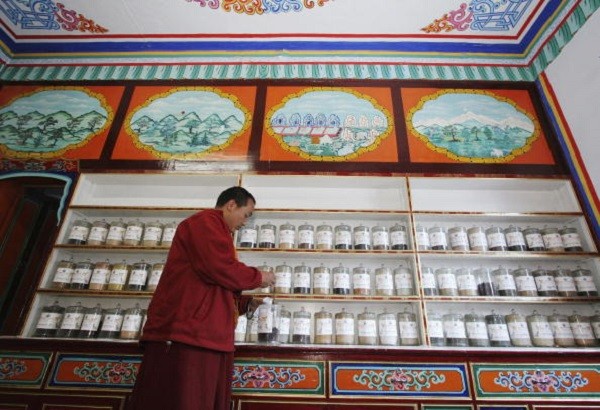Increasing demand for traditional Tibetan medicine allowed the sector to rake in 1.3 billion yuan ($201 million) in sales in China, according to a report released Tuesday by the regional health commission.
The report included figures from leading company Qizheng Tibetan Medicine, which boasts of 950 million yuan ($147 million) in sales with net profits of 238 million yuan ($36.84 million), Xinhua reported.
Qizheng Tibetan Medicine, known for manufacturing ointments and plasters to relieve pain from rheumatism, supplies Tibetan medicine to more than 20,000 medical facilities and 22,000 drugstores across China.
According to the regional health commission, all companies included in the report were certified with Good Manufacturing Practices for Pharmaceutical Products.
Tibetan medicine traces its roots to the ancient Tibetan culture. According to the University of Minnesota, the first international conference on Tibetan medicine was held in Samye Monastery in Tibet during the 18th century.
The conference was attended by delegates from China, India, Persia and other places. Historians say the famous Tibetan doctor Elder Yuthok Yonten Gonpo gathered the best and important notes and compiled them into the "Gyueshi," an ancient Tibetan medicine textbook.
"Tibetan medicine contains rare herbs that grow only at high altitudes and with adequate exposure to the sun," Nyima Tsering, president of the Tibet College of Tibetan Medicine in Lhasa, told Xinhua.
The practice also uses parts of animals and insects.
Because traditional Tibetan medicine has proven effective in treating diseases, many Chinese doctors and patients are becoming drawn to it.
"Ancient Tibetan medical practices such as bloodletting and herbal baths, for example, are effective in easing rheumatoid arthritis, cardiovascular and cerebrovascular diseases, as well as chronic digestive system illnesses," Nyima said.
Ma Shaobu, manager at one of the biggest drugstores in Lhasa, said that rheumatism relief plasters and pills for stroke patients are among their best-selling products.
"Tourists from interior Chinese regions make up 15 to 20 percent of our total customers," Ma said.



























